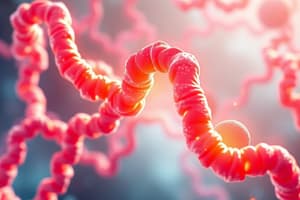Podcast
Questions and Answers
Proteins are polymers of _____
Proteins are polymers of _____
amino acids
What type of bond joins the monomers in a protein's primary structure?
What type of bond joins the monomers in a protein's primary structure?
peptide
The secondary structure of a protein results from
The secondary structure of a protein results from
hydrogen bonds
Tertiary structure is not directly dependent on
Tertiary structure is not directly dependent on
At which bond would water need to be added to achieve hydrolysis of the dipeptide?
At which bond would water need to be added to achieve hydrolysis of the dipeptide?
Some regions of a polypeptide may coil or fold back on themselves. This is called _____, and the coils or folds are held in place by _____.
Some regions of a polypeptide may coil or fold back on themselves. This is called _____, and the coils or folds are held in place by _____.
What makes one amino acid different from another?
What makes one amino acid different from another?
Which bonds maintain the primary structure of a protein?
Which bonds maintain the primary structure of a protein?
The a-helix and B-pleated sheet are examples of which level of protein structure?
The a-helix and B-pleated sheet are examples of which level of protein structure?
What disruption occurs when lactase is transferred to pH 5?
What disruption occurs when lactase is transferred to pH 5?
Interactions between the side chains (R groups) in a polypeptide are most important in stabilizing which of the following?
Interactions between the side chains (R groups) in a polypeptide are most important in stabilizing which of the following?
What would changing a single amino acid in a protein of 325 amino acids do?
What would changing a single amino acid in a protein of 325 amino acids do?
Which of the following statements is an accurate description of proteins?
Which of the following statements is an accurate description of proteins?
What could happen if a genetic mutation replaced a hydrophobic amino acid in a polypeptide with a hydrophilic one?
What could happen if a genetic mutation replaced a hydrophobic amino acid in a polypeptide with a hydrophilic one?
Which level of protein structure is a characteristic of some, but not all, proteins?
Which level of protein structure is a characteristic of some, but not all, proteins?
Flashcards are hidden until you start studying
Study Notes
Protein Structure and Function
- Proteins are made from polymers of amino acids.
- Peptide bonds link monomers in a protein's primary structure.
- The secondary structure of proteins, including α-helices and β-pleated sheets, is stabilized by hydrogen bonds.
- Tertiary structure relies primarily on interactions among side chains (R groups) and not on peptide bonds.
- Hydrolysis of dipeptides restores amino acids, necessitating the addition of water at the peptide bond.
- Regions of a polypeptide can coil or fold due to secondary structure, which is also stabilized by hydrogen bonds.
Amino Acids and Variability
- There are 20 different amino acids, distinguished by unique side chains (R groups) attached to an α carbon.
- Peptide bonds specifically maintain the primary structure of a protein.
- Altering a single amino acid in a protein can change its primary structure and may sometimes affect its biological function and tertiary structure.
Enzyme Activity and pH Dependency
- Lactase, a single polypeptide enzyme, hydrolyzes lactose into monosaccharides, functioning optimally at pH 6.
- Transferring lactase to pH 5 significantly diminishes enzyme activity, likely due to disruptions in secondary and tertiary structures.
Structural Levels of Proteins
- Interactions between side chains are crucial for stabilizing the tertiary structure of proteins.
- The primary structure refers to the sequence of amino acids defined by the genetic code in DNA.
- Quaternary structure is present in some proteins, involving the assembly of multiple polypeptides.
Impact of Mutations
- A mutation causing a hydrophobic amino acid to convert to a hydrophilic one can disrupt protein interactions leading to altered protein shape and function.
Studying That Suits You
Use AI to generate personalized quizzes and flashcards to suit your learning preferences.




